|
|
|
Sort Order |
|
|
|
Items / Page
|
|
|
|
|
|
|
| Srl | Item |
| 1 |
ID:
178406
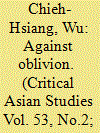

|
|
|
|
|
| Summary/Abstract |
This study focuses on art projects that reflect human rights violations committed by the Guomindang (KMT) government on Taiwan during the Republic of China’s (ROC) White Terror Period between 1949 and 1991. It starts with a brief introduction to this historical period in Taiwan, followed by a discussion of artwork that seeks to preserve personal memories in the absence of official records. The paper contrasts official art projects initiated by KMT and Democratic Progressive Party (DPP) administrations in recent decades that aim to address the difficulties of transitional justice, such as the silence of victims, fading memories, and misapprehensions between generations, with spontaneous artwork that responds to the official narratives of past injustice.
|
|
|
|
|
|
|
|
|
|
|
|
|
|
|
|
| 2 |
ID:
178394
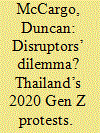

|
|
|
|
|
| Summary/Abstract |
This article offers a preliminary analysis of the hundreds of youth-inspired mass protests staged in Thailand during 2020. It argues that while calling for reforms and flirting with revolutionary rhetoric, the protestors lacked a clear programmatic agenda and were primarily engaged in disrupting dominant narratives about the country’s politics, especially in relation to the previously taboo question of the political role of the monarchy. Despite the ad hoc and sometimes incoherent nature of the protests, the students mounted a dramatic challenge to Thailand’s ruling elite. Ultimately, the conflict exemplified a generational divide: people from Generation Z, aged under 25, have radically different understandings of power, deference and legitimacy from older population groups. Whatever happens to the protest movement in the short term, the demonstrators have made a decisive break with the old social consensus that existed during the long reign of the late King Bhumibol (1946–2016).
|
|
|
|
|
|
|
|
|
|
|
|
|
|
|
|
| 3 |
ID:
178395
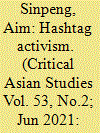

|
|
|
|
|
| Summary/Abstract |
The Thai 2020 anti-government protests were the first large-scale pro-democracy protests in Thailand mediated on Twitter. How has Twitter been used by anti-government supporters and to what effect? This article examines the use of hashtags by activists during the early stages of the Thai 2020 anti-government protests. Using an original dataset of 27,233 Twitter data points drawn from the #FreeYouth (FYM; #เยาวชนปลดแอก) campaign, the article argues that Twitter was used primarily to build collective narratives and disseminate movement information, rather than to mobilize offline protest activities. The key topic conversations within the Free Youth networks focus on discontent towards the government and demands for democracy, suggesting that Twitter was central to mobilizing pro-democracy collective action frames. The article further argues that the Free Youth networks on Twitter were loosely connected through community clusters of weak ties, not tight crowds. The challenge for FYM activists going forward is to support ties across its online networks that will strengthen over time, or risk becoming an ephemeral network of convenience that can only be mobilized on an ad hoc basis.
|
|
|
|
|
|
|
|
|
|
|
|
|
|
|
|
| 4 |
ID:
178407
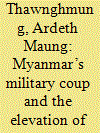

|
|
|
|
|
| Summary/Abstract |
The military overthrow of Myanmar’s elected government in February 2021 has again thrown into upheaval the troublesome relationship between civilian politicians and armed forces that has plagued the country since its first military coup in 1962. t has also brought back into view the relationship between Myanmar’s Bamar majority and the country’s ethnic minorities, a fractious issue that has long been subject to band-aid and patchwork solutions that skirt around the deeper causes of minority disaffection. Myanmar’s minority groups have long-standing grievances against the repression and brutality of the Bamar-dominated military and feel marginalized. Their attitude to the Bamar-dominated National League for Democracy (NLD) government of 2016-2021, led by Aung San Suu Kyi until her ouster and arrest, was one of despair at the continuing death and destruction brought by civil conflict, dismay at the silence of political leaders on the plight of civilians displaced by war, and anger at the quasi-authoritarian policies by the civilian administration. These dynamics have helped determine allegiances in the ongoing protests against military rule, pressed the ousted government into changing its policies to better reflect minority aspirations, and will likely transform Myanmar’s political landscape in a manner that would have been inconceivable before the coup.
|
|
|
|
|
|
|
|
|
|
|
|
|
|
|
|
| 5 |
ID:
178402
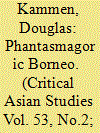

|
|
|
|
|
| Summary/Abstract |
The island of Borneo has been the subject of starkly different portrayals. On the one hand, the devastation of the island’s great rainforests, choking haze from fires set to clear land for oil palm plantations, and open-pit coal mining have prompted visions of environmental collapse. On the other hand, Indonesian President Joko Widodo’s 2019 announcement that the national capital will be moved from Jakarta to East Kalimantan prompted utopian dreams that massive investment and technology will create a glorious future. This article explores how these competing portrayals of Borneo emerged historically through European and American fiction – including utopian novels, lost race stories, and pulp and science fiction – and are reflected and reproduced in Indonesian political thinking. The final section examines how these long-standing ideas about Borneo as the site of the fantastic and the phantasmagoric have colored media reporting and commentary about President Widodo’s planned new capital in East Kalimantan.
|
|
|
|
|
|
|
|
|
|
|
|
|
|
|
|
| 6 |
ID:
178405
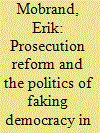

|
|
|
|
|
| Summary/Abstract |
A public struggle in South Korea around prosecution reform brings into focus a deeper battle between forces seeking to make the state more responsive to ordinary people and those aiming to preserve the status quo. Opponents of prosecution reform turned to a mode of politics that appropriated the styles and symbols of democracy to justify the obstruction of reforms that would break down a key authoritarian legacy and source of entrenched privilege. They deployed multiple methods of “faking” democracy: assuming the mantle of anti-corruption champions, drawing on tropes from the anti-authoritarian opposition of the past, and normalizing marginal views. The politics of prosecution reform illuminates the mass struggle that defines South Korea’s democracy and also points to a dangerous and subtle mode of politics that is increasingly visible around the world yet under-appreciated in most approaches to thinking about democracy.
|
|
|
|
|
|
|
|
|
|
|
|
|
|
|
|
| 7 |
ID:
178401
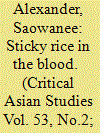

|
|
|
|
|
| Summary/Abstract |
This article examines the extent, form, and motivations for Isan people’s involvement in the 2020 Thai youth protests, both in Thailand’s northeast region and in Bangkok. Based on observations of more than two dozen protests, news analysis, and interviews, this paper argues that Isan people’s participation in these protests was driven by a desire to exert political agency and address the political inequality of khon isan (Isan people), which has been omnipresent throughout the region’s long history of political struggles.
|
|
|
|
|
|
|
|
|
|
|
|
|
|
|
|
| 8 |
ID:
178397
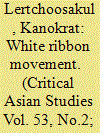

|
|
|
|
|
| Summary/Abstract |
This article discusses the motivations behind the involvement of high school students in the anti-government protests across Thailand in 2020. Drawing on 150 school and 150 university student interviews, focus groups, and observation of sixteen protests conducted around the country, it argues that protesting youths were motivated by grievances against repressive, authoritative and unaccountable conservative education systems and political institutions, particularly the monarchy.
|
|
|
|
|
|
|
|
|
|
|
|
|
|
|
|
|
|
|
|
|